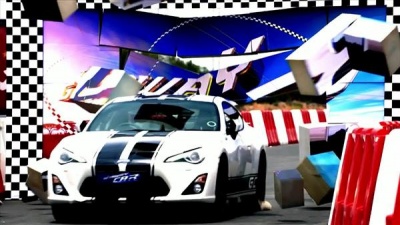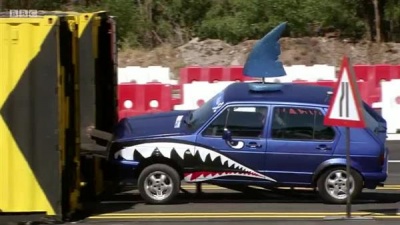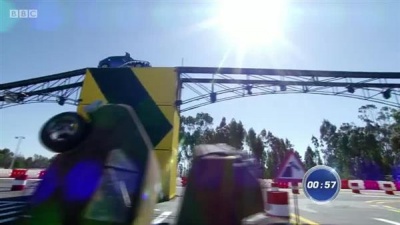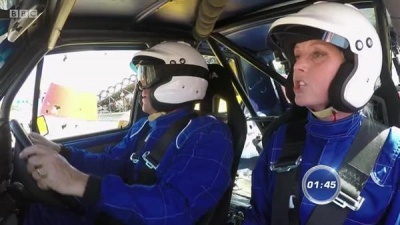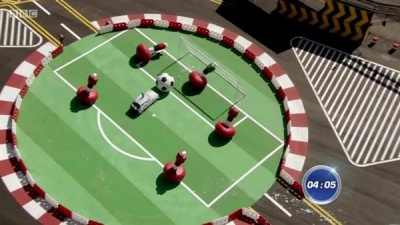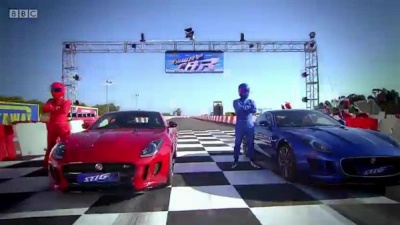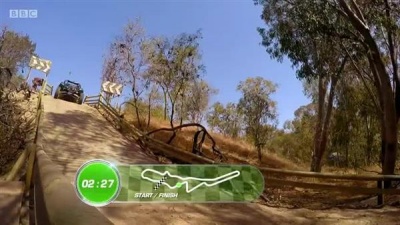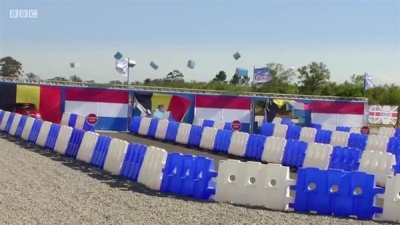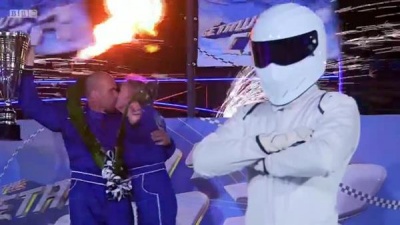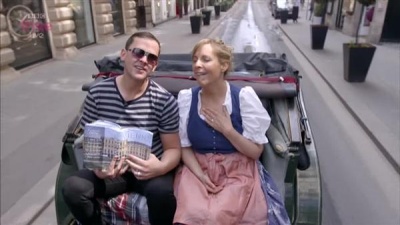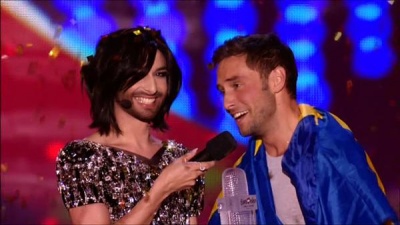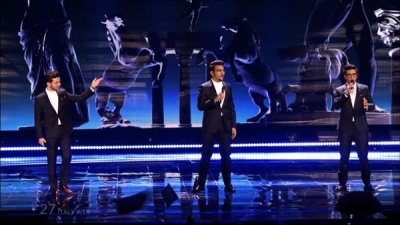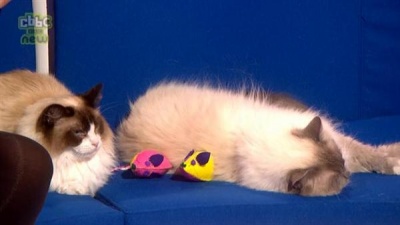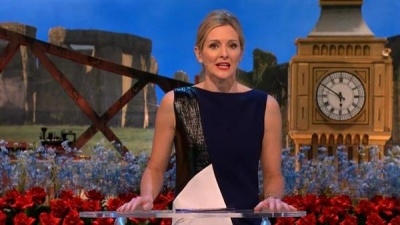Weaver's Week 2016-02-21
Last week | Weaver's Week Index | Next week
We hear that they are nearing a major agreement in Europe. The voters will be invited to shout their opinion and then jeer at the knowitalls on the panel. More on this developing story if we get it.
Contents |
The Getaway Car
BBC1, from 16 January
The BBC's great hope for this winter is The Getaway Car. Their press releases and pre-publicity were shot through with the note that "we made this". "It's our idea", and "don't even think about recreating this yourself."
The Beeb want to make a mint from licensing this programme around the world. Yeah, good luck with that.
Dermot O'Leary is the host, and he promises "the ultimate relationship test". So it's going to be an hour of people sitting around in their room, opening mystery parcels from foreign friends, and asking "how does one pronounce the name Benke?"
No! It's going to be an hour of watching other people drive each other. Around the bend, over the edge, and up the wall. And that's just in the first round!
Five couples join Dermot in the wilds of South Africa, where they get to drive various cars around various courses. We don't get to meet all of the couples in the opening moments. Three are given a brief description (Pat and Jess, they're postal delivery workers from the countryside) and we're into the action. It's a brisk start, and it has to be – we've already sat through two minutes of introductory tease, opening credits, and clips from what we're about to see.
The opening round begins with the team in a standard car, the sort you might drive on the road. Assuming that you didn't mind being laughed at by everyone else, thanks to your naff alloy wheeltrim and the gauche "Clara and Hugo" visor strip. Oh, and the hulking great foam shark's fin protruding from your roof. There has to be a reason why the cars carry these massive appendages, but we never find out why.
The challenge in round one is to get round an obstacle course, known on the show as "Hazard Highway". It begins with "the multi-scarey car park", a near-vertical descent that flattens out onto the tarmac road. The car's engine works with gravity to produce speeds of nought to sixty in no time at all. Gravity also helps in "Tin can alley", a gap that is like Jeremy Clarkson's ego – too small for the thing it's got to contain. The car has to drive at an angle, Clarkson just floats off down the river.
A pair of seesaws come next, and the pun block was kicking in because Dermot calls these "the seesaws". C'mon, Dermot mate, how are you going to sell this programme around the globe with boring old names like that? Can't you call them the Pivots of Peril? The Teeter-Totters of Terrible Torment? Again, gravity kicks in: once the car passes the pivot point, its weight will bring the bridge down and the team can drive on.
While the contestants travel over the Bridge of Doom, gravity takes a teabreak. The bridge is a pair of tracks high above the tarmac, the drivers are to go up the incline and hope that they don't fall off.
Actually, hope has nothing to do with it: this bit is engineered to be safe. The tracks have ridges, and slight movements of the steering wheel will be deflected by the grooves. The only way someone's going to fall off is if they completely panic and jerk the steering wheel. As well as the foam motifs, the cars have been modified with roll bars, so if they do fall and turn upside down, they'll keep their shape while help arrives. Safety never takes a day off.
And, refreshed from its milky brew, gravity is back on duty. There's a car at the top of a steep slope? There's water coming down, and some sponge constructions to deflect the motor? Let's play carball!
The car returns to earth at speed, and there's a generous run-off area so no-one's going to get hurt. Then there's a segment where the driver goes most of the way around a roundabout while there are roadworks on. This simple task is made more difficult by blinding goggles, preventing the driver from seeing what's going on. Their passenger can see, and can talk.
"Human Sat Nav" has a simple challenge: Skippy has to remain calm and collected, and give clear directions to Gigglelady behind the wheel. Try not to run off the road, don't cut the corner, reverse hard left, avoid the pile of loose chippings. For added realism, there are no workers at the roadworks.
This section gives the participants the most trouble, it takes some minutes to navigate a simple roundabout. Doesn't help when Lumley confuses his left and right, doesn't help when Honeyman screeches "No, no, no!" as though she were Mrs. Carraway.
And here's the first problem. At this obstacle, The Getaway Car stops being a visual spectacle. It's no longer cars driving in dangerous places. The programme becomes grown-ups shouting at each other. The eight-year-old bit of the audience is going to get bored of this, so they intercut teams. We don't see one team from start to finish, we see one team start, then chop back to another team earlier on the course, then back to the first. That's another reason for the distinctive markings, make it a bit easier to see which team we're looking at even when we're not paying full attention.
After getting off the roundabout, the driver removes the goggles and can see again. But not for very long: they're going through a giant car wash, which will coat the windows in foam. Windscreen wipers going like the clappers, the pair drive at great speed into a football match.
The goal here is the goal. Drive at the ball, nudge it past the defenders into the back of the net, and then race off the pitch. This challenge is made more difficult by the foam they brought forward from the car wash, but gets easier as the foam melts in the air.
And after scoring the goal, the couple are off in search of their own goal: the finish line. It's a flying finish down the straight of a proper driving track, a speedy finish.
So, what has this got to do with relationships? Does this test the dynamic of the couple, work out who drives and who navigates? Or does it play to stereotypes: should Claude have driven? Who would have expected Lucy to fall to pieces? We're getting a lot of bickering, but nothing so demanding as that bit with the paddles on Mr and Mrs.
We're getting more elements of classic Saturday television. Communication skills, as tested on A Word in Your Ear. Putting ordinary people in extra-ordinary situations, like on The Late Late Breakfast Show. Having annoying nephews, like on Scrappy Doo.
Ah yes, because that's not the end of the show. If only it were. Five teams started, five teams finished. The two slowest pairs are at risk of elimination. They'll face a challenge like no other. A test so difficult that it's unique on British television. After sitting in the passenger seat of a car while someone else drives, they'll — sit in the passenger set of a car while someone else drives.
But this time, there's a difference. The drivers won't be their friend or relation. No, it'll be "Red Stig" and "Blue Stig", two characters that are meant to be nephews of "The Stig". We thought that "The Stig" lived on a dump, but we were wrong. Stig has grown up, put on some white overalls, covered his face with a crash helmet, and drives cars like PC Pinkerton is on his tail. Red and Blue are meant to be tearaway nephews; we find them to be unconvincing. They're not even as annoying as Scrappy Doo, they're just blank spaces without any personality.
While Red and Blue drive their passengers twice around the track, the players have a question to answer. It's a list question, such as "monarchs of England and the UK since 1066". Whichever player can give the more correct answers will remain in the contest; the loser is out. Of course, the players need to give their answers while going round a racing circuit at great speed, which is easier said than done. This segment is mercifully brief, gone in a minute.
Remember those roadworkers who weren't present at the roundabout? They're standing around at the "Off-Road Rage" location, and the teams travel to find them. Travelling in dune buggies, the teams are to complete a circuit of the course as fast as they can. Because this is a BBC show, there's a time penalty for knocking over road workers, and a bigger penalty for knocking over the foreman.
This isn't a video game, but it looks like one. There's a satisfactory "crump" when one of the stationary workers gets hit, and a graphic appears from his polystyrene remains.
Dermot's commentary is less satisfactory. He pretends that the lazing workers are miniature Stigs, and gives daft names to parts of the course. "Cheetah's Corner" is a banked corner, "Sillymanjaro" is a wooden bridge, and "Cape of No Hope" is out by a whole continent. The highlight is the first encounter with the workers, which can be seen through the trees from the start line.
Again, the two slowest times go for a quiz spin, worst goes out. A tie? They revert to times from the lap around that course.
Three teams remain for the final eliminator, the Drive Through. Dermot asks a this-or-that question with two plausible answers (Eurostar trains go to where: Belgium or the Netherlands?) At the end of a zig-zag course are two paper bursts, one showing the flag of the Netherlands, the other showing the Dutch flag. The teams' aim is to drive through the correct answer. Drive through, it's the name of the round. Geddit?!
Be right, and be fast. The slowest team getting the question wrong will lose one of their two lives. When teams all get the question right, the slowest overall.
On paper, this should be a gripping finale, the drama of a paper burst, too fast for the human eye to see. Which lane did they pick? Was it the right one? In practice, it's tedious and disjointed. The teams are in and out of their cars so often that we might ask them for an extra pint. What they could do is have the five drive-through rounds, but give points based on the ranking – 3-2-0 should prevent ties. Intersperse questions and answers to make the best show.
Eventually, one team remains, and they get to drive the titular Getaway Car. "It's the fastest car the teams have driven," notes Dermot. True, but the others have been two family cars and one off-road vehicle. This is a speedster, able to get from 0 to 60 almost as quickly as Kevin Pietersen. Two laps of the track, £10,000 in the kitty.
Stig follows the teams in his Dumpmobile, a car powered by cabbage and marsh gas. The Dumpmobile really moves at a clip, faster than the Getaway Car. Should Stig pass the team before the two laps are up, the couple will still bank some money based on how far they did get (£5000 for a full lap, with money gantries at £1000 and £3000.) For a show's finale, it's swift, completed in less than a minute.
It's very difficult for a winning team not to leave with something, very difficult for them to win the jackpot. All the players get a holiday in South Africa, which isn't so bad.
For the viewer, though, we get little. We don't see that the show tests relationships, it's 1990s docusoap Driving School with people who aren't Maureen. No-one is going to get badly hurt, injuring people on television is so 1980s.
The show lacks focus and loses pace as it goes on. The obstacle course and target practice rounds are visually appealing, the quiz element is bolted on, and the final eliminator is done in the most tedious way possible. If we lost the quizzes in the middle, and just eliminated the slowest, that would make for a more coherent show.
Videos
The BBC hasn't released much video to the world.
Loop, the graphics designers, exhibit their work.
The Stig may have appeared to seven million people on Top Gear, but that still leaves fifty million people who aren't familiar with the character. To them, it's a mute driver in a white suit, devoid of personality and magnetism. Spinning off this non-character with a fake family – Red and Blue are equally plain – just doesn't work.
We need some reason to root for the winners, or some reason to barrack against The Stig, or at the very least a solid hour of entertainment. We don't get any of these things.
The most annoying part is that The Getaway Car is so nearly there. It needs a touch of nasty, some spice to add to Dermot's gentle sugar. Give us a comedy villain like Leslie Grantham's Boyard, or an evil genius producer (what's David Young doing these days?) We hope the show becomes an international hit, outside ideas will improve the BBC's domestic show.
Douze Points Ever Again
Point inflation has struck at the Eurovision Song Contest. From this May's event, each participating broadcaster will have two sets of points to hand out. Our example is how it might have unfolded last year.
The link-up to broadcasters' spokesfolk will remain. This time the continent's Scott Millses will only be reading out the jury results, graded on the traditional one-to-twelve points. After all 43 jury spokesfolk have had their say, we'll know the jury winner was SVT.
Each broadcaster also operates a televote, by phone, mobile device application, and SMS. (That's except for viewers in San Marino, where there isn't an independent telephone network. And for viewers in the UK, where SMS voting doesn't happen for reasons lost in the mists of time.)
All these national points combine and are presented in one massive block. It's a landslide of points: starting with the least popular, televotes will be added to the jury scores. "La France, trois points. France, three points". Ces européens sont des imbéciles et des Philistins. Il y pas de changement. "Le Royaume-Uni, huit points. The United Kingdom, eight points", a score that will leave Electro Velvet stone last.
And so it'll go on, with surprises here and there. LTV of Latvia was second on the jury vote, but only picks up 91 from the televotes. RTSH from Albania failed to score with the juries, but picks up 92 points from the televotes. EER Estonia was unloved by the juries, but soars from the televote.
In the end, it comes down to three. "La Suede, deux cent soixante-dix points. Sweden, two hundred seventy points." Runaway winners of the jury final, third in the televote. If anyone in Europe is still awake and sober enough to do the calculations, victory for Mans and Stick Boy is assured. But can Graham Norton do industrial-strength mathematics in his head that quickly? Not likely!
"La Russie, deux cent quatre-vignts huit points. Russia, two hundred eighty eight points." Norton asks if RAI can do it from here, overcome a gap of nearly 200 points. "How many for, combien pour L'Italie? Trois cent cinqante huit points. Italy, three hundred fifty eight points". SVT wins with a combined score of 630 points, ahead of RTR and RAI.
The EBU reckons this will add only 4 minutes to the current show. On the surface, this looks unlikely. Even if they combine all the lower songs into one reveal, it's a moment of high drama, they're going to milk it for all it's worth.
They may make the time up elsewhere. The adjudicators get an extra 45 minutes after the televote to count and verify the results. Final scores don't need to be ready until the final Scott Mills delivers the final jury result. We might trim the interval act / post-voting advert break to about seven minutes, saving a full quarter hour while the scrutineers scruit.
And the EBU might tape the jury results ahead of time. The scores are known by Saturday morning, they're not going to change. It would take little effort to have the national Scott Millses record a piece during the afternoon rather than deliver it live at 11pm. We would be sure that the link-ups would work (because they'd been done earlier), and might even edit out the stalling from YLE's Scott Mills.
There are holes in this idea. We'd rather work up the jury result table, it makes it impossible to call the winner before the penultimate vote is announced. 361 points remain for Sweden and Latvia; can either overtake Russia? It's also easier for Graham Norton to explain to the watching millions.
Will there be a slight resurgence of neighbourly voting? Perhaps, but we think the effect will be marginal. Might alter which songs progress to the final, but the current system has produced some odd results. For instance, San Marino's entry would not have made the 2014 final under any other voting system.
Our main problem is the EBU's plot to make up results for broadcasters where the televote fails or doesn't take place. Didn't BBC folk get fired for less? San Marino doesn't have a televote, and its points will be faked from other nations. It would be instructive for the EBU to explain – perhaps after the event – how they concoct the "San Marinese televote" out of breadcrumbs and butterbeans.
As a television show, this works. As a contest of popular song, we'll have to see.
Mastermind
Second round, show 2
Another high-scoring match this week. Sarah Greenan scored 8 on Wainwright's coast-to-coast walk, and answered her general knowledge questions confidently. 18 (2 passes) won't bring her to the final.
Bruce Horton scored 8 on the Green Bay Packers, and crept up on correct answers like a lion stalking its prey. By the time the buzzer fired to scare him off, he'd reached 19 (1 pass). Ewan Paton took Jethro Tull (which turned out to be the rock band), he advanced from 9 to 21, a very strong score giving the others quite something to tilt at.
Chris Yates scored X on The 10 Men comics, and closed here on 18 (1 pass). He fell behind the required rate early on, and many of his answers were only a little wrong. But wrong is wrong. Simon Alvey had made 10 (and a pass) when answering on Eamon de Valera. He needed 12 right answers to win, and we're not going to get another tie-break. Again, the contender falls behind with some early errors, but keeps answering well. Not quite well enough: his final score is 21 (3 passes).
Ewan Paton takes the second place in the final.
This Week and Next
A reader asks why we didn't mention that "Sue Perkins is the first female presenter of a mainstream British comedy TV panel show", courtesy of her hosting role on Insert Name Here. We didn't mention it because we don't believe it to be a fact.
By "mainstream", one has to exclude What the Dickens, seen by an audience of literally dozens on the obscure Artsworld channel, and presented by Dame Sandi Toksvig. By "TV", we must exclude radio shows like S Perkins' own Dilemma, The News Quiz (Toksvig again), Fighting Talk (Georgie Ainslie), and many more.
Even restricting our view to the major channels, we don't agree. We might nominate Sue Barker, host of A Question of Sport since 1997. For at least the last decade, AQoS has been light-hearted entertainment, no-one cares who won the last show. Jo Brand's Hot Potatoes (BBC1, 2002) may qualify, though this column must confess no memory of this show.
Gabby Logan beat Perkins when she hosted I Love My Country in 2013. Mainstream television (BBC1), a panel show intended to make people laugh, and as British as Yorkshire pudding and roast lamb.
The Jump continued, and no-one got hurt. Boring as anything, wasn't it. Replacement contenders have arrived, and last week's eliminated contestant James "Arg" Argent was one of them. Mr. Argent was very much one of them, he left the competition twice in the space of a week.
Dogs to pilot a light aircraft, reported The Independent this week. Twelve pooches are being trained in problem-solving and reasoning, and the one that responds best to whistled commands over the aircraft radio will get to fly Jamie Theakston around the Oxfordshire countryside. Where did we leave the film labelled "It's Your Blood"?
Peter Bazalgette has a new job, he's the executive chairman of ITV. During the last century, the Man Alive researcher rose to head the Endemol company. He invented Ready Steady Cook and Changing Rooms. In 2000, he brought Big Brother to our screens, followed in 2005 by The Farm. "Baz" left the television business in 2007, and has spent the last four years at the head of Arts Council England.
Nick Grimshaw has decided not to try again on This Week's Musical Showoff. Grimmy spent last autumn on the obscure and unpopular ITV singing show, and it will merit little more than a footnote in his autobiography.
Here's a surprise: Copycats is back. CBBC want to find another vehicle for Sam and Mark, and the family show is their pick. We really hope it's the fun first series, and not the drab second run.
University Challenge continued the group phase with an outside broadcast. The result: Stirling University 1-0 Edinburgh University. Stirling are now second in the Lowland League, miles behind runaway leaders Edinburgh City.
BARB ratings in the week to 7 February.
- Call the Midwife remains the most-seen show, with 10.05m. The Great Sport Relief Bake Off was top game, on 7.45m
- The Voice was just behind, with 7.4m. Win Your Wish List returned with 4.25m viewers, ahead of Ninja Warrior on 3.85m.
- The Chase (3.05m) proved more popular than University Challenge (2.9m). We don't have figures for the Big Brother final, but do know The Jump continued with 2.05m crash fans.
- Take Me Out The Gossip (990,000 on ITV2) came ahead of A League of Their Own (910,000 on The Satellite Channel).
A new run of Let's Play Darts for Comic Relief, this year for Sport Relief (BBC2, Sun). Just a Minute opens another run (Radio 4, Mon), and the BBC inflicts another song for last place in Eurovision You Decide (sic) (BBC4, Fri). The longest-running British song contest, Can i Gymru (S4C), goes out on 5 March. After a month recharging its batteries, The Getaway Car returns (BBC1, Sat). BBC The Voice moves into battle rounds, while The Archive Hour (Radio 4) has an episode titled "Skill, Stamina, and Luck".
Photo credits: BBC, EBU / ÖRF, 12 Yard / Black Dog, Talpa / Wall to Wall
To have Weaver's Week emailed to you on publication day, receive our exclusive TV roundup of the game shows in the week ahead, and chat to other ukgameshows.com readers, sign up to our Yahoo! Group.


